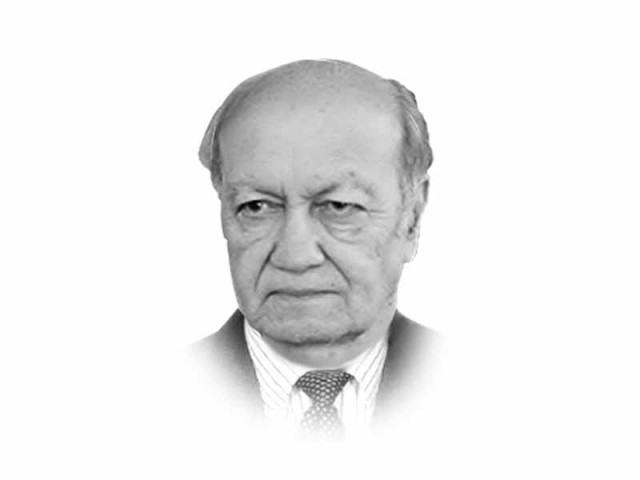MQM’s struggle for survival
The military leadership should take a nuanced approach in dealing with the MQM

The writer is a retired lieutenant general of the Pakistan Army and a former federal secretary. He has also served as chairman of the Pakistan Ordnance Factories Board

The immediate fallout from this irate behaviour has been that the party leadership in Pakistan was left with no option other than to disown and dissociate itself from Altaf Hussain and strongly condemn his remarks. Initially, some analysts considered this a tactical move on part of party leaders to protect themselves from the establishment’s wrath. Others view it as a genuine split in the party and characterised it as a soft coup led by the MQM’s deputy convener, Farooq Sattar. More likely, the local MQM leadership must have realised it was politically, morally and legally untenable to support Altaf Hussain. If the party were to survive it has to cut the umbilical cord from the ‘supreme’ leader. Having lived under the shadow of Altaf Hussain’s ruthless dictatorial grip, the party was deliberately managed in a way that it did not throw up a viable second tier leadership. Nonetheless, if it is allowed to function normally, Sattar and other senior leaders should be able to repair the damage and revive the MQM. Consequences of any overkill in the form of banning the party and demolishing its local offices and zonal centres is likely to prove counterproductive and should be avoided at all costs.
While the party leadership will be doing some serious soul-searching and moving towards self-correction and reforms, it has to completely disband its militant wing. It should command respect and support on the basis of its performance and not draw sustenance from instilling fear of retribution. It is indeed worth reflecting that military and political leaders generally coexisted or clearly closed their eyes to the formation of militant wings within political parties. General Ziaul Haq and Pervez Musharraf pampered and promoted the MQM. They deliberately ignored its wrongdoings as long as it served their narrow vested interests. Moreover, the division between the political and militant wings of the party has not been as distinct as the current reformists would like us to believe. There was a continuous overlap of political and militant activities. In this way, the MQM leadership shares responsibility for the crimes in which these militant wings were indulging in, be it, drug trafficking, smuggling or kidnapping. Sattar and his team have a Herculean task on their hand in redirecting the party on a new course that requires a different organisational structure with completely revised aims that are purely political in nature. If they fail to rise to the challenge, it will have serious consequences for the peace, stability and economy of Karachi and Sindh.
The military leadership should take a nuanced approach in dealing with the MQM. Bulldozing its offices and squeezing its political space could be counterproductive. It will prevent the more responsible elements from asserting themselves and throw the party in total disarray. Besides, it will generate a martyr syndrome and push the party underground, and this is exactly what Altaf Hussain is aiming at. Instead, what should be encouraged is Sattar winning back Mustafa Kamal’s splinter group. Uniting the parties on a common platform would be mutually beneficial as this will remove the stigma from the Pak Sarzameen Party that it suffers for being a handmaiden of the establishment. This would require egos and petty considerations to be set aside for the larger good.
Sattar should liberate the MQM from the victim mentality and liberate itself by aiming to be a national rather than an ethnic entity. The current crisis provides the party an opportunity to recast itself and change its public perception. It is the right time also for the PPP government in Sindh to remove the quota system and other legal and administrative barriers that have prevented full integration of people of different ethnicities and widened the rural-urban divide. The quota system has prevented the promotion of merit and added to the grievances of Karachi residents. The PPP-MQM differences have hurt Karachi badly. Continous indifference shown by successive PPP governments towards the city have dwarfed its growth and deprived its citizens of basic amenities of life. The revival of the local bodies system with good management and provision of adequate resources provides a fresh opportunity to correct Karachi’s chronic infirmities. The MQM has swept the local bodies elections and there is no justification for denying the party its mandate of running the affairs of Karachi and Hyderabad. Adopting a measured approach and giving the MQM its due rights is likely to foster a greater sense of responsibility and reduce alienation. It will also prove Altaf Hussain wrong that the military and certain segments of the bureaucracy are intrinsically against it. Its victory was indicative that the MQM still commands a large vote bank that needs to be respected and not crushed.
No city or country can ever prosper on the basis of exclusivity. We need an inclusive narrative and integrated national policies that can help build Karachi and Pakistan on a more solid and enduring basis.
Published in The Express Tribune, August 31st, 2016.
Like Opinion & Editorial on Facebook, follow @ETOpEd on Twitter to receive all updates on all our daily pieces.
















COMMENTS
Comments are moderated and generally will be posted if they are on-topic and not abusive.
For more information, please see our Comments FAQ